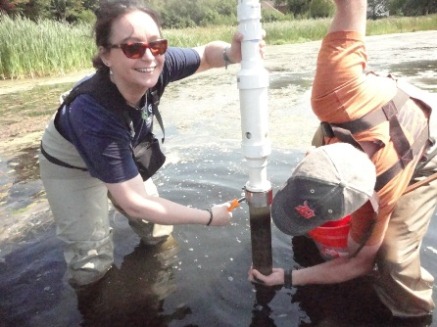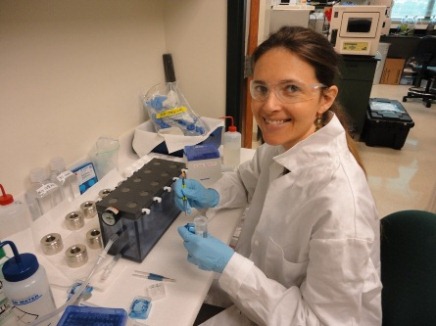A Closer Look #133 October 2013 Newsletter
AWRI Collaborative Research:
How will water level fluctuations alter the microbial community in coastal wetland ecosystems?
Coastal wetlands are particularly sensitive to water level fluctuations (WLF), given their location at the land-water interface. Alternate dry and wet periods associated with WLF can result in sediment exposure and oxidation, which can cause substantial release of nutrients, such as phosphorus (P). The nutrient released from the sediment could stimulate algal blooms, resulting in impaired water quality, reduced ecotourism, and impacted fisheries.
Dr. Solange Duhamel from Columbia University is currently working with researchers at AWRI, Dr. Geraldine Nogaro and Dr. Alan Steinman, to assess 1) the effects of WLF on P release from the sediment to the water column and 2) the bioavailability of the P released for microbial nutrition in the water column. Sediment cores were collected in August 2013 from moderately nutrient-rich and highly enriched wetlands, which are part of the Muskegon Lake Area of Concern, and allowed to dry simulating water level declines.
In October 2013, the sediment cores were rewetted with surface water collected at the respective sites, simulating water level recovery. Experiments are being conducted to determine if nutrients released from the desiccated/rewetted sediments into the water column affect structure and function of the microbial community (bacteria and phytoplankton). This research will provide important information on the ecological impacts of WLF on Great Lakes coastal wetlands, especially with regard to potential negative effects of water level fluctuations on water quality.

Pictured on Left: Dr. Geraldine Nogaro collecting sediment cores.

Dr. Solange Duhamel in the lab.
LMC Events
Oct 1 & Oct 3
Whitehall Middle School students visited the Annis Educational Foundation Classroom for hands-on activities and took a vessel cruise on the W.G. Jackson. The visits were funded by the Alcoa Foundation.
Oct 2
The Muskegon Area Chamber of Commerce held their Muskegon in Focus meeting in the Multipurpose Room and took a vessel cruise on the W.G. Jackson.
Oct 18
Series Seminar: Matt Breen, Native Aquatics Biologist with the Utah Department of Natural Resources, presented: "Native fish management in the upper Colorado River basin: conservation and recovery efforts in northeastern Utah".
Oct 22
An Educator Workshop: Project Learning Tree and Project WET, was held in the Annis Educational Foundation Classroom.
Oct 30
Special Seminar: Kevin Walters, Aquatic Biologist Aquatic Invasive Species with the Michigan Department of Environmental Quality (MI DEQ) Water Resources Division, presented: Aquatic Invasive Species Management Perspectives and Opportunities from Michigan's State Agencies.
Activities
Jim McNair represented AWRI at the GVSU Undergraduate Research Fair on the Allendale campus on October 1. Bopi Biddanda was also in attendance, representing Michigan Space Grant.
Carl Ruetz attended a Coastal Wetland Monitoring meeting held at Kellogg Biological Station on October 31.
Ryan Thum attended a meeting at Kellogg Biological Station on October 18 called 50 Years of Aquatic Ecology Research.
Janet Vail supervised a water festival held at Montague High School for 3rd grade students on October 2. The festival was funded by the Alcoa Foundation.
Janet Vail attended the Lake Michigan Monitoring Coordination Council workshop and a Lake Michigan Forum dinner in Sheboygan, WI on October 15.
Presentations
Rod Denning and John Koches presented to the Fremont Area Community Foundation Ice Mountain Board on October 9 regarding a new Critical Lands Mapping Project in the Upper-Central portion of the Muskegon River.
Leon Gereaux and Scott Kendall participated in a Biofuels Workshop at Muskegon Community College on October 18 and also gave a presentation:
Gereaux, L.* and S. Kendall. Oral. Growing algae of biofuel potential.
Scott Kendall participated in an Acoustic Doppler Current Profiler Technology workshop at the Ocean Sciences Meeting in San Diego, CA on October 1-2, and gave a poster presentation:
Kendall, Scott. Poster. Seasonal trends of currents and mixing during ice and ice-free periods in Muskegon Lake, MI.
Mark Luttenton was recently a guest lecturer for 2 classes of BIO 105 and 2 classes of BIO 323.
Rick Rediske and Brian Scull each presented at the 2013 Michigan Green Chemistry and Engineering Conference held at GVSU on Oct 14.
Rediske, R. Oral. Polybrominated diphenyl ethers: from your couch to your dinner table in three easy steps.
Scull, B. Poster. The Implementation of microscale chemistry in the AWRI Laboratory.
Carl Ruetz was a guest lecturer for an Environmental Journalism class at Michigan State University on October 22.
Al Steinman presented at Ohio University in Athens, OH on October 4.
Al Steinman presented at a Green Town meeting in South Bend, IN on October 10.
Al Steinman was a guest lecturer for Mark Luttentons BIO 610, Scientific Methodology, class on October 17.
Al Steinman co-hosted and presented at the inaugural Blue Economy Project meeting held in Grand Rapids on October 18. There were approximately 40 people in attendance from various state-wide agencies or institutions.
Al Steinman was a guest lecturer for Bopi Biddandas BIO 699, Independent Study, class on October 22.
Al Steinman was an invited attendee at a meeting on Integrated assessment of water levels in Great Lakes from a broad perspective at a meeting at University of Michigan in Ann Arbor on October 28. Al gave a presentation on Ecological Impacts.
Janet Vail was a guest speaker for the Allendale section of Environmental Studies 201 on October 8.
Janet traveled to Sheboygan, WI for the 2013 State of Lake Michigan Conference on October 16. She gave the welcoming remarks at the start of the conference. The next SOLM conference will likely be in Michigan in 2015.
Publications
Bopi Biddanda and other members of his lab were co-authors on an article published in Biogeochemistry:
Nold, S. C., M.J. Bellecourt, S.T. Kendall, S.A. Ruberg, T. Sanders, V. Klump and B.A. Biddanda. 2013. Underwater sinkhole sediments sequester Lake Hurons carbon. Biogeochemistry 115:235-250.
Al Steinman is a co-author on an article published in Environmental Management:
Havens, K.E. and A.D. Steinman. In Press. Predicting the responses of a large shallow lake (Okeechobee, Florida) to climate change and potential future hydrologic regimes. Environmental Management. DOI 10.1007/s00267-013-0189-3.
AWRI In the News
Students study water quality aboard GVSU research vessel
CBS Detroit, October 2, 2013 The article is about the Alcoa-funded trips aboard the W. G. Jackson that six 8th grade classes from Whitehall Middle School took in late September/early October.
GVSU Annis Water Resources Student Spotlight
The Lanthorn, Danielle Grimm, undergraduate student working in the Dr. Ryan Thum Lab at AWRI was highlighted in this article. We also mention that we are currently accepting applications for Winter 2013.
With Great Lakes stuck at historic lows, talk turns to adapting
Crains Detroit Business, October 16, 2013 Al Steinman is quoted regarding the low lake levels.
75K grant funds study of blue economy
Grand Rapids Business Journal, October 18, 2013 Al Steinman is quoted regarding the blue economy.
Alcoa Foundation funds environmental studies
White Lake Beacon, October 20 26, 2013 The article is about the Alcoa-funded trips aboard the W. G. Jackson that six 8th grade classes from Whitehall Middle School took in late September/early October.
Great Lakes state playing catch-up in effort to build water-based economy
Bridge (Magazine), The Center for Michigan, October 23, 2013 AWRI was mentioned as a catalyst in the blue economy development taking place in the Muskegon area.
The five best practices for success in your major
The Lanthorn, October 24, 2013 Matt Breen, former graduate student at AWRI, was mentioned in this article.
Muskegon's realty reality: improving housing market being fueled by out-of-town buyers
MLive, October 29, 2013 AWRI is mentioned as offering master's degrees in Aquatic Science.

